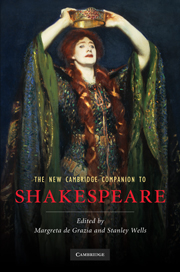Book contents
- Frontmatter
- 1 The traces of Shakespeare’s life
- 2 Shakespeare’s reading
- 3 Shakespeare’s writing: from manuscript to print
- 4 The theatre of Shakespeare’s London
- 5 The transmission of Shakespeare’s texts
- 6 Shakespeare and language
- 7 Shakespeare the poet
- 8 Shakespeare’s comedies
- 9 Shakespeare’s tragedies
- 10 Shakespeare’s English history plays
- 11 Shakespeare’s classical plays
- 12 Shakespeare’s tragicomedies
- 13 Shakespeare, religion and politics
- 14 Shakespeare and race
- 15 Shakespeare, sexuality and gender
- 16 Shakespeare on the stage
- 17 The critical reception of Shakespeare
- 18 Shakespeare and popular culture
- 19 Shakespeare and globalization
- 20 Shakespeare and media history
- 21 Shakespeare: reading on
- Index
17 - The critical reception of Shakespeare
Published online by Cambridge University Press: 28 January 2011
- Frontmatter
- 1 The traces of Shakespeare’s life
- 2 Shakespeare’s reading
- 3 Shakespeare’s writing: from manuscript to print
- 4 The theatre of Shakespeare’s London
- 5 The transmission of Shakespeare’s texts
- 6 Shakespeare and language
- 7 Shakespeare the poet
- 8 Shakespeare’s comedies
- 9 Shakespeare’s tragedies
- 10 Shakespeare’s English history plays
- 11 Shakespeare’s classical plays
- 12 Shakespeare’s tragicomedies
- 13 Shakespeare, religion and politics
- 14 Shakespeare and race
- 15 Shakespeare, sexuality and gender
- 16 Shakespeare on the stage
- 17 The critical reception of Shakespeare
- 18 Shakespeare and popular culture
- 19 Shakespeare and globalization
- 20 Shakespeare and media history
- 21 Shakespeare: reading on
- Index
Summary
So much has been written about Shakespeare since Robert Greene's first dismissive reference to that 'upstart crow' in 1592 that it may seem perverse to deploy the trope of absence or loss to try to make sense of the volume of commentary. Shakespeare's critical reception seems marked by the phenomenon of too much, rather than too little. But Shakespeare studies is littered with much-missed absences: Love's Labours Won (the mysterious play named in Francis Meres' Palladis Tamia of 1598), Shakespeare's private letters or diary, satisfactory drawings of the Globe or of any of Shakespeare's plays in contemporary performance, the records for the grammar school in Stratford for the relevant period, the holograph manuscript of Hamlet or indeed any of the plays or poems, the identity of Mr W. H., the dedicatee of the Sonnets published in 1609, the meaning of 'scamels', Caliban's unglossable word in The Tempest (2.2.17). These literal unknowns mark the critical enterprise with the signs of loss. In the intervening centuries since Shakespeare, the critical tradition has tried to address this loss through literary tactics that closely resemble those of two familiar literary genres: the elegy, through which the lost is mourned and commemorated, and the detective story, by which the lost is reconstructed through the painstaking reading of evidence. Shakespeare studies has toggled between the detective and the elegiac as the most appropriate genres for its retrieval and construction of the lost object.
- Type
- Chapter
- Information
- The New Cambridge Companion to Shakespeare , pp. 253 - 268Publisher: Cambridge University PressPrint publication year: 2010
- 1
- Cited by

